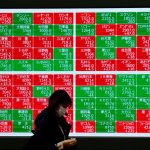NEW YORK/LONDON (Reuters) -MSCI’s global equities index staged an afternoon rebound on Friday as investors repositioned for month-end, while the dollar fell with Treasury yields as data showed a modest rise in U.S. inflation in April.
After spending most of the session in the red, the MSCI All Country World Price Index turned positive ahead of a rebalance of the index.
When Wall Street trading ended, the global index was up 0.57% at 785.54 after falling as low as 776.86 earlier.
“When you get an upside reversal it’s always a good sign if you’re bullish,” said Joe Saluzzi, head of Equity Market Structure Research and co-head of equity trading at Themis Trading. He cited month-end portfolio adjustments for the late session buying.
Before the market opened on Friday, the U.S. Commerce Department said the personal consumption expenditures (PCE) price index, widely seen as the Federal Reserve’s favoured inflation indicator, increased 0.3% last month, in line with expectations and the March increase, while core PCE rose 0.2%, compared with 0.3% in March.
While some strategists said they were relieved inflation wasn’t hotter than expected, Robert Pavlik, senior portfolio manager at Dakota Wealth in Fairfield, Connecticut said the data didn’t change much in terms of interest-rate expectations.
“The core PCE this morning didn’t really do anything … It was just a status quo type of report so there is no indication that the Federal Reserve is going to be on hold longer, or going to cut rates sooner.”
Separately the Chicago Purchasing Managers Index (PMI), which monitors the health of manufacturing in the Chicago region, fell to 35.4 from 37.9 last month and was well below economist expectations of 41.
For the week, the MSCI index was showing its second consecutive decline but a monthly gain.
On Wall Street, the Dow Jones Industrial Average rose 574.84 points, or 1.51%, to 38,686.32, the S&P 500 gained 42.03 points, or 0.80%, to 5,277.51 and the Nasdaq Composite lost 2.06 points, or 0.01%, to 16,735.02.
Earlier, Europe’s STOXX 600 index closed up 0.3%. While the index advanced 2.6% for the month it fell 0.5% for the week in its second consecutive weekly decline.
Data showed euro zone inflation rose more than expected in May, though analysts said it was unlikely to stop the European Central Bank from lowering borrowing costs next Thursday but may cement the case for a pause in July.
In currencies, the dollar index, which measures the greenback against a basket of currencies including the yen and the euro, fell 0.15% to 104.61 and was showing its first monthly decline in 2024 after the data.
The euro was up 0.16% at $1.0849 but against the Japanese yen, the dollar strengthened 0.27% to 157.24.
In Treasuries, yields fell after the signs of inflation stabilization in April, suggesting to some that the potential for the Fed to cut rates later this year remained intact.
The yield on benchmark U.S. 10-year notes fell 5.1 basis points to 4.503%, from 4.554% late on Thursday while
the 30-year bond yield fell 3.4 basis points to 4.6511% from 4.685%.
The 2-year note yield, which typically moves in step with interest rate expectations, fell 5.2 basis points to 4.8768%, from 4.929% late on Thursday.
On the energy front, oil prices fell as traders focused on Sunday’s OPEC+ meeting, which is expected to determine the fate of the producer group’s output cuts.

U.S. crude settled down 1.18% at $76.99 a barrel and Brent settled at $81.62, down 0.29% on the day.
Gold fell 0.68% to $2,326.97 an ounce on the day but was tracking for a fourth straight monthly gain.
To read the full article, Click Here

